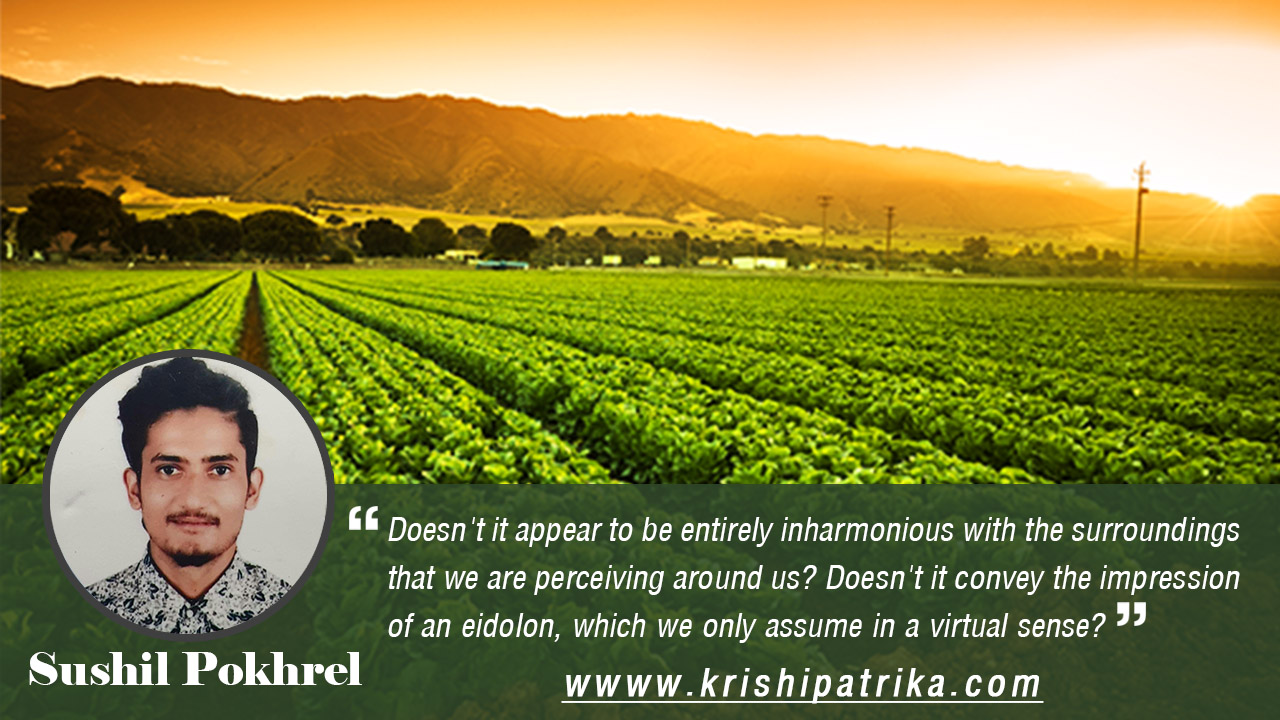
The monsoon is yet to come. It’s been more than a month since the last rainfall. Nevertheless, the landscape and farming fields of the community are astonishingly full of green. The surrounding is enriched by a variety of pleasant, colorful plants, mesmerizing sounds of birds and animals, and with a splendid glimpse of nature that anyone can easily fall into. Unlike other communities, this community has never been vouched for any form of drought for a very long period. In addition, the place has a year-round crop and livestock production, consisting of all the diversity that their local ecosystem supports and enhances. Including birds and animals, humans residing here have never faced the scarcity of either food or water during their lifetime.
As we move further deep into the community, we can discover the fact that the majority of the households in this place are engaged directly in the agricultural production system. Likewise, approximately all of the residents are hooked with any form of agriculture, either it belongs to the aspects of a factor of production, the process of production, or even post-production management. And more surprisingly, they are prosperous and happier as well. Similarly, each house possesses plenty and a variety of nutritious foods. They even export their surplus products in their nearby communities, ensuring inclusive participation of all the community members with equity in share and benefits – either it is monetary or non-monetary.
This might sound absurd! Doesn’t it appear to be entirely inharmonious with the surroundings that we are perceiving around us? Doesn’t it convey the impression of an eidolon, which we only assume in a virtual sense?
Without a question, yes, it’s true. Yes, because we cannot believe in a happy farmer’s face. Yes, it is because we have witnessed a tremendous amount of trade deficit on agri-products, despite being a citizen of an agricultural country. Yes, it is absolutely true that we assume a society to be progressive and prosperous with concrete, steel and bars, but not with living natural elements.
Yes, it is all true, because we are here talking about a place called Utopia, which resembles the one explained by Sir Thomas More (1478-1535 A.D.). A doctrine allied to socialism.
We human beings can easily smear into the depth of an ideology, whether it is political or non-political. But we are reluctant in bringing those ideologies into a reality. Moreover, for us, it is hard to believe that most of the prevailing ideology is the collective sum of our senses that we perceive through our surroundings, rather than absolute one’s imagination. Indeed, it is a state of being natural, where there are little or no external disturbances.
In a similar sense, the community which we were discussing above could also exist in our real-time. A community with year-round water for all purposes, green landscape, prosperous farmers, filthy rich agro-biodiversity are not an ideal thing that only exists in our imagination. We might not probably find the same community as mentioned above; however, we are attested to every single condition separately around the globe. The only effort essential here is to stack up all the components into a common roof. In short, the entire reformation of modern agriculture towards a natural state of agriculture operated by nature itself, a doctrine based on the philosophy of Masanobu Fukuoka (1913-2008 A.D). A socialist reformation as explained by Marxism. As the contemporary agricultural system is more worsen due to the capitalist modes of production. So a revolutionary change primarily in the aspects of production factors and the process of production is a must.
The foremost crucial aspect is the factor of production, which includes all those inputs that are essential before cultivation. For instance- seed, water, soil, and fertilizers. Under capitalism, these are the major factors contributing to the total cost of production. This entanglement is halting many people from being connected with agriculture. Being unable to bear the load of production cost, even more, people are being deprived of farming.
Apart from external artificial entities, a greater number of people do not even have proper access to natural inputs such as seed, soil, and water. Nowadays, these inputs are categorized under legal commercialized components, rather than being completely free natural elements. Honestly, have our past ancestors ever imagined that the human race would have to pay a cost for growing crops?
Not. As they might have even not thought of capitalism too. So the basic problem here in agriculture is associated with the very beginning process of production. To transform this system of food production, the preliminary task to be carried out is simply making all the factors of production accessible to anyone at any time without any cost or service in return. As a consequence, this will certainly encourage a greater number of people to participate in the food production process. Motivate them to grow food for themselves. Pressurize everyone to grow healthy and nutritious foods safely and sustainably.
Likewise, it will also definitely bestow an opportunity for each one to be familiar with nature, its cycle, its supremacy, and its nature of integrity. More importantly, it will deliver the lesson that Homo sapiens is not a species superior to nature, they are just a minute part of it. This is how we can reform our agriculture with a very first step and ensure a safe, healthy, and sustainable food production system.
Let’s everyone get involved here and flourish together.
Let us not use food as a weapon of war.











